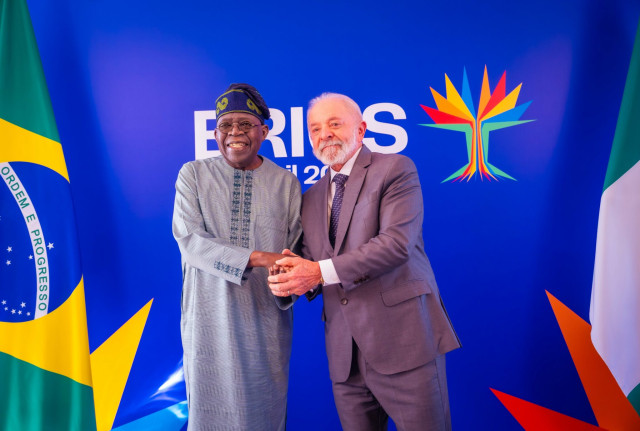President Bola Tinubu expressed his commitment on Saturday to his Brazilian counterpart, Luiz Inacio Lula Da Silva, to eliminate obstacles that are hindering the growth of Nigeria’s agricultural sector, particularly bureaucratic delays that impede the sector’s capabilities.
He emphasized that these efforts would promote food sovereignty and boost exports, especially in livestock production.
This declaration came during a bilateral meeting at the Copacabana Forte, attended by both country’s cabinet members.
The Special Adviser on Information and Strategy, Bayo Onanuga, communicated this in a statement released on Saturday night, titled ‘We’re Removing All Bottlenecks To Improve Food And Agric Production In Nigeria, Says President Tinubu To Brazilian Leader.’
The President shared that Nigeria is undergoing reforms aimed at enhancing the economy's global competitiveness, with a specific focus on agriculture, where the nation possesses a competitive edge.
“Tinubu remarked that all technicalities within the agreements between Nigeria and Brazil would be streamlined and expedited, particularly in sectors like trade, aviation, energy transition, food and agricultural development, mining, and exploration of natural resources,” the statement partially disclosed.
He recognized Brazil’s exemplary research and development services, which render it among the leading producers of food and agricultural commodities.
In terms of livestock farming, Tinubu pointed out his administration's initiatives to attract investment in poultry, cattle rearing, and fisheries, noting the potential for long-term partnerships between Nigeria and Brazil within the blue economy.
He asserted that Nigeria is ready to embark on a robust partnership and take prompt action to enhance food production.
“The President highlighted the significant role of subnational governments in food and animal production in Nigeria, complementing federal efforts to leverage agriculture as a vital source for employment and resource mobilization.
Lula affirmed that all agreements with Nigeria would be formalized, and the MOUs will be updated and signed promptly during President Tinubu’s next visit.
He cautioned that the persistent bureaucratic barriers between the two nations should be dismantled to achieve swift outcomes, adding that Brazilian research and development institutions would collaborate with Nigeria to improve livestock farming.
Minister of Agriculture, Senator Abubakar Kyari, noted that Tinubu has persistently prioritized food security for Nigeria, targeting its realization through both local and international partnerships.
He also mentioned that Nigeria currently holds a competitive advantage in fertilizer production that could be further enhanced.
The Minister of Livestock Development, Idi Maiha, identified three key focus areas for partnership with Brazil: health and disease management, sanitary services, and research into genetic materials and new breeds.
The meeting was attended by governors including Hyacinth Alia of Benue State, Dapo Abiodun of Ogun State, Mohammed Umar Bago of Niger State, Sheriff Oborevwori of Delta State, and Babajide Sanwo-Olu of Lagos State.
Governor Abiodun stated that the subnational bodies would reinforce the federal government’s framework to rejuvenate the agricultural sector, noting that including a business forum during President Tinubu’s visit would introduce new ideas and resources, facilitating rapid improvements in Nigeria’s agricultural landscape.
The Minister of Foreign Affairs, Yusuf Tuggar, and Mohammed Mohammed, Director General of the National Intelligence Agency, also took part in the bilateral meeting.




















